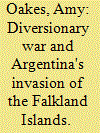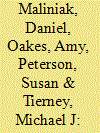|
|
|
Sort Order |
|
|
|
Items / Page
|
|
|
|
|
|
|
| Srl | Item |
| 1 |
ID:
076995


|
|
|
|
|
| Publication |
2006.
|
| Summary/Abstract |
Why do states launch diversionary conflicts? In particular, why did Argentina invade the Falkland Islands in 1982? The existing literature tends to analyze diversionary conflict by examining the direct relationship between domestic unrest (the independent variable) and the use of force (the dependent variable). But such an approach ignores critical variables that shape the likelihood of diversionary conflict. When states face domestic unrest, they have a number of options: they can launch a diversionary conflict, they can reform, or they can repress. We therefore need to consider which variables alter the attractiveness of each of these options, employing what I term "the policy alternatives approach." The decision to launch a diversionary conflict may result more from the inability to reform or repress, than it does from the perceived utility of using force to rally the public. An important variable that facilitates or constrains a state's ability to reform or repress is state extractive capacity. The policy alternatives approach enables a new explanation for the invasion of the Falklands, based on the interaction between domestic unrest and low state extractive capacity, and also highlights a number of other variables that may explain diversionary conflicts.
|
|
|
|
|
|
|
|
|
|
|
|
|
|
|
|
| 2 |
ID:
107811


|
|
|
|
|
| Publication |
2011.
|
| Summary/Abstract |
Using two new data sources to describe trends in the international relations (IR) discipline since 1980-a database of every article published in the 12 leading journals in the field and three surveys of IR faculty at US colleges and universities-we explore the extent of theoretical, methodological, and epistemological diversity in the American study of IR and the relationship between IR scholarship and the policy-making community in the United States. We find, first, that there is considerable and increasing theoretical diversity. Although US scholars believe and teach their students that the major paradigms-realism, liberalism, Marxism, and constructivism-define and divide the discipline, most peer-reviewed research does not advance a theoretical argument from one of these theoretical traditions. There is no evidence, moreover, that realism and its focus on power relations among states dominate, or since 1980 ever has dominated, the literature. Second, although three times as many IR scholars report using qualitative methods as their primary approach, more articles published in the top journals currently employ quantitative tools than any other methodological approach. Third, there exists little epistemological diversity in the field: American IR scholars share a strong and growing commitment to positivism. Finally, there is a disjuncture between what American scholars of IR think about the value of producing policy-relevant work and the actual research they generate: few articles in top journals offer explicit policy advice, but scholars believe that their work is both prescriptive and useful to policymakers.
|
|
|
|
|
|
|
|
|
|
|
|
|
|
|
|
|
|
|
|
|